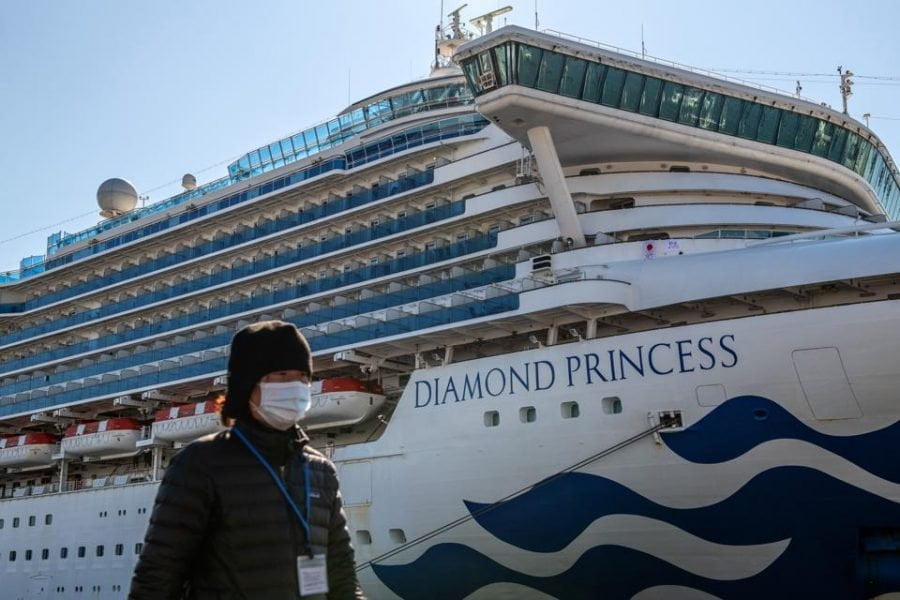From Jacobin
From Cruise Ships To Floating Prisons
One of the first media stories that lifted the pandemic beyond China’s borders (a long ten months ago) was the quarantining of the Diamond Princess. This British-owned cruise ship was quarantined at the port of Okinawa, Japan in early February, with almost four thousand passengers and crew on board. Over the following month, one-fifth of the passengers were infected and gradually flown off to their respective countries or disembarked at port (the crew were less fortunate and less mobile). There were fourteen deaths. This was followed by other mass outbreaks on cruise ships: the Rotterdam, the Zaandam, the Ruby Princess, and the Greg Mortimer — all luxury holiday vessels that helped spread the virus around the world. The last of these was probably responsible for half the cases in Australia.
Alongside the many criticisms made of how the Japanese authorities blocked everyone on board, leading to unnecessary deaths, it quickly became clear that cruise holidays would be one of the first markets to be axed in the name of human survival. Or rather, that the perils were so clear that tourists would soon disappear — and the invisible hand of the market would do its work. The sector sank. The cruise companies had, recently, began to hoist hopes of a new start to their ventures — but the second wave dashed such vanities.

Leaving aside the glee one may draw from the shipowners’ misfortune, cruise holidays also provide an extraordinary symbol of our contemporary crisis. They bring the generational divide — a far wealthier older generation with expendable capital — into collision with the hypermobile internationalism of contemporary capitalism. The same hypermobility, that is, which brought us just-in-time logistics operations, international art fairs, and (as the Marxist geographer David Harvey has rightly pointed out) the pandemic itself.
The cruise holiday’s disappearance was marked by a “traumatic” event: holidaymakers being held in quarantine on the ships. Indeed, journalists focused on passengers’ complaints and the sight of the upper classes roughing it onboard, while paying much less attention to the thousands of crew members trapped in cramped conditions. And as the cruise companies went bust and photographs of the new ship graveyards circulated on the internet, replete with the watery tears of the World Economic Forum and Saudi princes, far fewer words have been given over to one of the more peculiar yet indicative ways in which the sector has been rerouted: the “quarantine ship.”
The Italian government first landed on the idea of using ships to quarantine newly arrived migrants from Africa back in May, when the ferry liner Moby Zazà was sequestered for this purpose and docked near the island of Lampedusa with several hundred people trapped on board. Since then, two cruise companies — GNV and SNAV — have won public tenders to provide a small fleet of cruise ships employed to quarantine hundreds of people at a time. The companies are being paid around €100 per person, per day for this service: over €1 million a month per ship.
Those on board — mostly from Tunisia, but also Bangladesh, Ethiopia, Libya, Syria, and across West Africa — have experienced widely varying living conditions in isolation. Some of the ships have doctors and lawyers on board. Less fortunate passengers have seen only guards, crew, and police dogs. Newly arriving migrants, having already passed through the hell and high water of the Libyan war and the Mediterranean Sea, are trapped on board for a month or more, in conditions that potentially favor rather than prevent contagion. Even more extraordinarily, several cases have been brought to light of asylum seekers being sent from centers on mainland Italy to the quarantine ships, whether as a prevention against contagion or simply to punish those who rebel.
Perhaps we might more aptly baptize such vessels “temporary prison ships” or even “floating hot spots.” This last phrase is especially appropriate given that a few years ago the Italian government proposed that the so-called EU border “hot spot” centers (for the mass identification and detention of newly arriving immigrants, experimented on Italian and Greek islands) be set up on ships — naming them “floating hot spots,” no less. The idea was dumped by the EU for infringing on just one too many human rights. But in love, war, and pandemic, anything goes. Here’s a short transcription of a video made by a young Ghanaian man removed by the Red Cross from his refugee hostel in the middle of the night:
Last Sunday they bring people, say that they want to test us for COVID-19 . . . they tell me, they said I have positive. They take me from Roma to Palermo . . . I was asking my camp people — who tell me I am positive — so tell me, where is my positive document? They couldn’t show me . . . So now everyone in Roma with coronavirus, they are going to collect them on the ship? They quarantine me in Palermo, now we are in the Bari seaport, right now. Since they brought me here, no medicine, I couldn’t see doctor with my face . . . Try your best, and post [this video] to everywhere, so that the Italian leaders can also play it, to hear it, to fight for we the immigrants.
Leave a Reply
You must be logged in to post a comment.